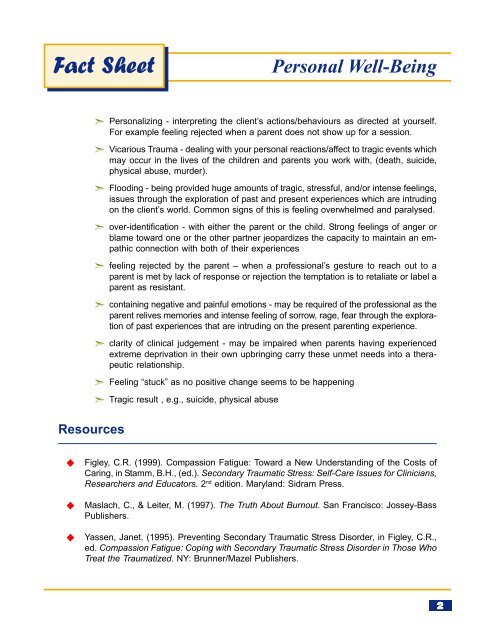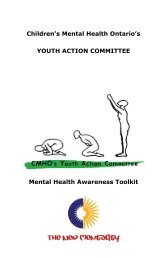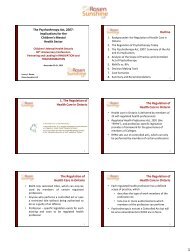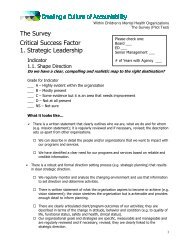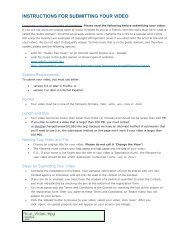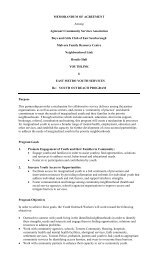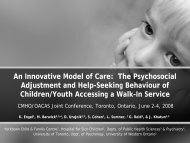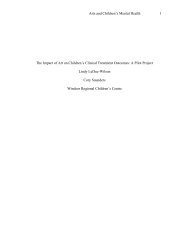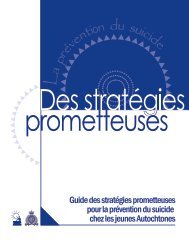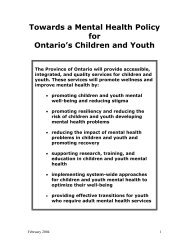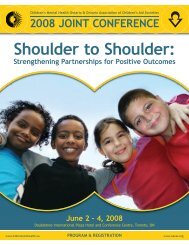Early Childhood Mental Health Treatment: Training Reference Guide
Early Childhood Mental Health Treatment: Training Reference Guide
Early Childhood Mental Health Treatment: Training Reference Guide
Create successful ePaper yourself
Turn your PDF publications into a flip-book with our unique Google optimized e-Paper software.
Fact Sheet<br />
Personal Well-Being<br />
Personalizing - interpreting the client’s actions/behaviours as directed at yourself.<br />
For example feeling rejected when a parent does not show up for a session.<br />
Vicarious Trauma - dealing with your personal reactions/affect to tragic events which<br />
may occur in the lives of the children and parents you work with, (death, suicide,<br />
physical abuse, murder).<br />
Flooding - being provided huge amounts of tragic, stressful, and/or intense feelings,<br />
issues through the exploration of past and present experiences which are intruding<br />
on the client’s world. Common signs of this is feeling overwhelmed and paralysed.<br />
over-identification - with either the parent or the child. Strong feelings of anger or<br />
blame toward one or the other partner jeopardizes the capacity to maintain an empathic<br />
connection with both of their experiences<br />
feeling rejected by the parent – when a professional’s gesture to reach out to a<br />
parent is met by lack of response or rejection the temptation is to retaliate or label a<br />
parent as resistant.<br />
containing negative and painful emotions - may be required of the professional as the<br />
parent relives memories and intense feeling of sorrow, rage, fear through the exploration<br />
of past experiences that are intruding on the present parenting experience.<br />
clarity of clinical judgement - may be impaired when parents having experienced<br />
extreme deprivation in their own upbringing carry these unmet needs into a therapeutic<br />
relationship.<br />
Feeling “stuck” as no positive change seems to be happening<br />
Tragic result , e.g., suicide, physical abuse<br />
Resources<br />
<br />
<br />
<br />
Figley, C.R. (1999). Compassion Fatigue: Toward a New Understanding of the Costs of<br />
Caring, in Stamm, B.H., (ed.). Secondary Traumatic Stress: Self-Care Issues for Clinicians,<br />
Researchers and Educators. 2 nd edition. Maryland: Sidram Press.<br />
Maslach, C., & Leiter, M. (1997). The Truth About Burnout. San Francisco: Jossey-Bass<br />
Publishers.<br />
Yassen, Janet. (1995). Preventing Secondary Traumatic Stress Disorder, in Figley, C.R.,<br />
ed. Compassion Fatigue: Coping with Secondary Traumatic Stress Disorder in Those Who<br />
Treat the Traumatized. NY: Brunner/Mazel Publishers.<br />
2


